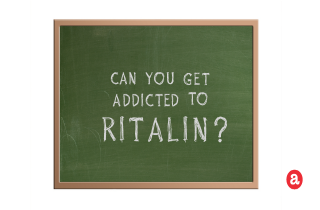A:Yes! You can get addicted to Ritalin if you are not using it as directed by your doctor.
Ritalin (main ingredient methylphenidate) is used in the treatment of individuals diagnosed with narcolepsy and attention deficit hyperactivity disorder (ADHD). It belongs to the group of cerebral stimulants, with similar effects on the brain and body as cocaine and amphetamine. Ritalin is listed as a Schedule II substance in the U.S. Controlled Substances Act, which means it has a high potential for abuse that can lead to dependence.
Are you eager to find out what actually causes Ritalin addiction? Learn more on how you can recognize if you or someone you know has become addicted to Ritalin. We also explain what you can do to prevent addiction, and invite your questions at the bottom of the page.
What does Ritalin do in the body?
How does Ritalin work? When taken orally, Ritalin slowly raises dopamine levels over the course of an hour or so. Ritalin, like cocaine and amphetamine, increases the active level of dopamine in the central nervous system. This neurotransmitter is important for the reinforcement of behavior, stimulating the feeling of pleasure in the brain. Specifically, Ritalin blocks the reuptake molecules of dopamine into the neuron that released it, so there is a surge of dopamine in the synapse.
As a part of a treatment plan for ADHD, Ritalin works by blocking the transporters and allows more dopamine to reach receptors. This helps increase attention signalling which helps people with ADHD to focus.
Medicines with similar compounds as Ritalin
Other medicines that contain methylphenidate (Ritalin’s main active ingredient) can be found under the following brand names:
- Aptensio
- Concerta
- Metadate
- Methylin
- Quillichew
- Quillivant
Other medicines intended for the treatment of ADHD symptoms, include:
- Adderall
- Concerta
- Vyvanse
Can you get addicted to Ritalin?
Yes. Ritalin can be addictive when abused.
Usually, people who abuse Ritalin take it as a substitute for cocaine and experience the same addictive dangers. The consequences of Ritalin addiction manifest as drug cravings and withdrawal side effects when the drug is not available. However, addiction is different than drug dependence or drug tolerance … effects that occur during regular, therapeutic dosing, as well.
Frequent use of Ritalin causes tolerance, which means you need a larger dose of the drug to feel the wanted effects. Further, physical dependence also forms with repetitive and chronic Ritalin use. When your body develops dependence to Ritalin, you can expect to feel a number of extremely uncomfortable withdrawal symptoms whenever you try to lower the usual dose or stop using it completely.
Due to the habit forming potential of this drug, there are some precautions that you should take before you start treatment:
- Do not take larger doses of Ritalin than those prescribed.
- Do not determine the frequency or length of Ritalin use without a doctor’s consultation.
- Only use this medication for its intended purposes.
How do you get addicted to Ritalin?
You can get addicted to Ritalin if you abuse it illegally. When you take Ritalin without a prescription it means that you do not have a legitimate medical reason to use it. Another method of abuse that may lead to addiction is taking it in very high doses. Individuals with a previous history of drug and alcohol abuse should be extremely careful when it comes to taking Ritalin recreationally.
Why do people with ADHD have a lower chance of addiction than those who abuse it? People diagnosed with ADHD experience different effects when they take their medication. Ritalin paradoxically CALMS the brain in people with ADHD; it works in the way that it helps the users reach a certain point where they have more focus and concentration.
Signs of Ritalin addiction
When addiction to Ritalin if formed, you can expect the addict to display visible and recognizable obsessive thinking and compulsive Ritalin craving. Another way to recognize addiction to Ritalin is by realizing that an individual continues to use this medication even after they suffer unpleasant consequences. The addictive behavior influences a person’s life in general, and is mainly recognized as a serious condition. When a person relies on Ritalin in order to function normally and perform daily activities, it may be time to seek professional help.
How to avoid Ritalin addiction
Ritalin addiction can be avoided only by using it for its intended purposes – treatment of ADHD and narcolepsy. When Ritalin is used exactly as prescribed and directed by your doctor, it is considered safe.
Questions about Ritalin dependency
Still have questions about addiction to Ritalin? Please send them to us through the comments section below. We try to answer your questions personally and promptly, and in case we do not know the answer to your particular question, we will refer you to someone who does.









Related Posts